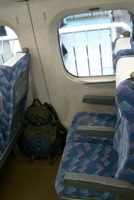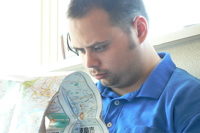
could be better, could be a lot worse
When I woke up this morning, my head wasn’t aching with the usual, cold cloud of mist that confuses my senses, forcing me to grope around helplessly for some reason as to why all five of them were just turned on without my permission. Instead everything was strangely clear, and I had some idea of my surroundings and of the purpose of my existence—thoughts that, in recent times, have eluded me immediately following the trip into consciousness. I could say that this morning was not normal. However, today the thoughts in my mind are traveling toward their conclusions without much need for roadside repair, and I realize that the opposite must be true.
Yesterday, the fifth of September, was the first free day that I’ve had in just under a month. By “free day” I mean a day in which I didn’t have to be out somewhere doing something, in which I could just sit in my dorm room and do nothing for a whole hour if I wanted. Before yesterday I was running through an obstacle course that I did not recognize, a bizarre maze without turns that did not seem to have an end. Several of the long days at work were followed by social gatherings of people in my company that I couldn’t really forego. Days off were filled with now-or-never activities that typically stretched from ascension from the aching mist cloud to re-submersion at the end of the day. And through most of that time I found it a goal beyond my abilities to get enough sleep at night. Each period of darkness outside and of considerably shorter darkness around me was consistently followed by another insufficient time of rest. It was only two nights ago and last night that I finally achieved the previously unreachable prize of eight glorious hours of eyelid-covered nothingness.
For Japanese, I am told, that is an abnormally long time to spend slumbering life away each day. Perhaps they see it as a waste of precious minutes not at work. Or maybe their secret to living “normal” lives, despite the untold hours in emotionless skyscrapers, is training their bodies to operate acceptably on half the rest that mine requires. Whatever their thinking, the idea that inevitably reaches my thought processing center is that they’ve given up. They have no will to fight the system that pulls and crushes their lives into identical shapes with the precision of a factory assembly line. Rather, they accept it fully, using their own volition to fit themselves into the situation even more ergonomically.
But in this case the part of my mind that has this fascinating tendency to make its own conclusions is wrong. One of the two people who opted to give me life, and who still lend it direction, sent me some of her own ideas. They were a bit humbling and, of course, made more sense than the nonsense that I had concocted.
There isn’t a war going on here: Japanese people aren’t fighting for a better system because there is no one to attack. The only actual choice that they have is whether they will go to work or not, and that really is no choice at all. I come from a land that, as compared to most other places on the planet, has unfair opportunity woven into its core. That pattern of weaving is what enveloped me as a child and even as an adult until I stepped into the ocean and then onto dry ground on the other side. Now from an unrealistically high chair I peer down onto the table, a disdainful toddler frowning at everyone’s acceptance of half-eaten cupcakes when I want a whole one.
With less unrelated imagery, what this means is that my internship has a fixed endpoint, and when that point arrives, I can escape the challenges of Tokyo life for good if I so desire. I have that choice. Everyone else around me here does not. Whereas for me this time is a valuable learning experience and a chance to improve my understanding of what I have, for the ever-changing sea of faces that I see swirling around me each day, this year is a only a fragment of decades of tireless effort that has no alternate course.
I am really grateful to have my eyes opened to such obvious truths because I don’t seem to see them on my own. My stubborn resistance to humility can make the most noticeable things completely invisible to me. In addition, I’m moving around so constantly that sometimes I feel like I’ve lost the ability to think. When I get to stop and think and write like this, it is a great relief find that my brain still works okay. Indeed, I never intended to cease doing either of those things—thinking or writing—and I will continue to partake of their riches as often as I am able. Some people have asked me about my blaug, wondering why it seemed to have ended. The answer is, No, I don’t desire to see its demise any more than someone who enjoys reading it. I just need a bit of free time to put thoughts into words that are (hopefully) worth reading. As often as that time is available to me, and I have something to say, then I will strive to say it.
Since an especially large expanse of time divides this entry from the last one, I won’t try to fill the whole thing with a detailed recounting of everything that has happened. Most of it is uncounted hours at work, anyway, where I have continued make photo albums and assist with studio photography. If anything noteworthy has happened, then I probably took pictures of it, and I’m including a huge photo (and video) update with this entry. Whether or not a picture is worth some arbitrary number of words, each one does a pretty handy job of showing you what I’m experiencing so far away.
While I’m gradually picking up artistic skills and hopefully a little more Japanese at work, my life otherwise feels like kind of a mess. Although my innate habit is to be organized and somewhat orderly in what I do, I have not lived like that here. There is a disarray of files and forgotten e-mails strewn about my computer, virtually every surface in my room has some kind of dust or filth on it (not to mention plenty of half-placed objects), and the lack of physical activity that continues to wrack my body is almost painful at times. Thankfully I’ve been able to strategize about the gym problem and to figure out a solution that I think will work. So I do expect that situation to improve completely over time. Then it will just be a matter of rationing out my free time in such a way that I can gradually return to what I might call the dignified state of living to which I am accustomed.
The world around me continues to operate normally, of course. And I would again emphasize that it does indeed feel normal to me, for the strangeness of being in Japan has faded, I would say, irreversibly. The landscape looks like concrete blocks with neon accents (or blotches) and an occasional tree; and that is what it’s supposed to look like. If I look around outside and see that over half of the people nearby are carrying long, hook-handled umbrellas, then I know that there is little chance rain won’t fall before I go to bed. On weekdays almost every man I see is wearing at least a dress shirt and slacks, if not a suit and tie. As for women, I can always detect their presence without looking because, no matter when or where I go, 95–97% of them are wearing fashionable, high-heeled shoes or sandals that make an unmistakable sound whenever they take a step.
And I am totally used to this, though that makes me no less inept at dealing with it: There is no societal agreement as to which side, right or left, one should move when walking forward on a collision course with someone coming the other way. The person in front of me might choose left, or he might choose right . . . which will it be? . . . oh, I can see it in his eyes, his intention to step to the left, slightly to th—ohp! nope, he went right.  There is no way to tell! On crowded sidewalks and in packed underground walkways this can pose a real challenge to my logical, must-be-one-or-the-other way of reasoning. Until I figure out some pattern to the puzzle, I’ve made it a habit either to walk way around people when possible or to just stop dead and force them to choose a stinking direction. What’s truly amazing, though, is that Japanese people almost never run into each other! They seem to have sensors installed (in their cell phones, I’ll bet) that tell them who is where and which way these surrounding people intend to turn. It’s like watching a hopelessly disorganized school of fish dancing around in discord, always just missing their mates with whom they’ve lost sync.
There is no way to tell! On crowded sidewalks and in packed underground walkways this can pose a real challenge to my logical, must-be-one-or-the-other way of reasoning. Until I figure out some pattern to the puzzle, I’ve made it a habit either to walk way around people when possible or to just stop dead and force them to choose a stinking direction. What’s truly amazing, though, is that Japanese people almost never run into each other! They seem to have sensors installed (in their cell phones, I’ll bet) that tell them who is where and which way these surrounding people intend to turn. It’s like watching a hopelessly disorganized school of fish dancing around in discord, always just missing their mates with whom they’ve lost sync.
 There is no way to tell! On crowded sidewalks and in packed underground walkways this can pose a real challenge to my logical, must-be-one-or-the-other way of reasoning. Until I figure out some pattern to the puzzle, I’ve made it a habit either to walk way around people when possible or to just stop dead and force them to choose a stinking direction. What’s truly amazing, though, is that Japanese people almost never run into each other! They seem to have sensors installed (in their cell phones, I’ll bet) that tell them who is where and which way these surrounding people intend to turn. It’s like watching a hopelessly disorganized school of fish dancing around in discord, always just missing their mates with whom they’ve lost sync.
There is no way to tell! On crowded sidewalks and in packed underground walkways this can pose a real challenge to my logical, must-be-one-or-the-other way of reasoning. Until I figure out some pattern to the puzzle, I’ve made it a habit either to walk way around people when possible or to just stop dead and force them to choose a stinking direction. What’s truly amazing, though, is that Japanese people almost never run into each other! They seem to have sensors installed (in their cell phones, I’ll bet) that tell them who is where and which way these surrounding people intend to turn. It’s like watching a hopelessly disorganized school of fish dancing around in discord, always just missing their mates with whom they’ve lost sync.Well, a major exception to the above would be onboard the crammed trains. Avoiding running into people is impossible there, even for Japanese. A few days ago this aspect of my daily commute put me into a somewhat uncomfortable situation. With no room to go anywhere else, a girl wearing a ridiculously short yet puffy skirt stood in front of where I was sitting, typing on my cell phone. Now behind the screen of my phone were the legs of a pretty girl, bare almost up to her waist; I’m glad that she wasn’t any taller. Some may be incredulous at my revulsion toward a chance to stare at a girl’s legs, but I am not a person who likes free sex with his Happy Meal. I don’t much care for the Happy Meal, either. (In Japanese they’re called Happii Setto, or “Happy Set.”)
It was so nice to discover that Japan is keeper also of a much more pleasant train riding experience. A friend of mine from UW, named Brian, recently moved to a city called Gifu (west and a little south of Tokyo) to teach English, and I got to ride a 300-km/h bullet train out there to visit him. It felt like riding on a quiet and unbelievably spacious airplane with more interesting sights out the window; the seats even reclined far enough that sleep entered the category of theoretically possible.
pleasant train riding experience. A friend of mine from UW, named Brian, recently moved to a city called Gifu (west and a little south of Tokyo) to teach English, and I got to ride a 300-km/h bullet train out there to visit him. It felt like riding on a quiet and unbelievably spacious airplane with more interesting sights out the window; the seats even reclined far enough that sleep entered the category of theoretically possible.
 pleasant train riding experience. A friend of mine from UW, named Brian, recently moved to a city called Gifu (west and a little south of Tokyo) to teach English, and I got to ride a 300-km/h bullet train out there to visit him. It felt like riding on a quiet and unbelievably spacious airplane with more interesting sights out the window; the seats even reclined far enough that sleep entered the category of theoretically
pleasant train riding experience. A friend of mine from UW, named Brian, recently moved to a city called Gifu (west and a little south of Tokyo) to teach English, and I got to ride a 300-km/h bullet train out there to visit him. It felt like riding on a quiet and unbelievably spacious airplane with more interesting sights out the window; the seats even reclined far enough that sleep entered the category of theoreticallyIt is probably hard to tell in this picture, but that’s practically enough leg room for a whole giraffe.
Other than just seeing a familiar face in Japan, my purpose in going was to help Brian get set up in his new living situation a little. He was facing difficultly completely the opposite of that which has been troubling me, wherein he was given absolutely nothing to do. Everyone in his company had left for a week-long vacation a day or two after Brian had arrived. That left him with no one to assist him or answer his questions as he tried to figure out how to live in Japan for his first time. Worse still, it was about 40 °C, or over 100 °F—and very humid—in Gifu at the time, and his apartment was thoughtful enough not to include air conditioning by default. I guess the landlord had been hoping to take in some desert lizards as tenants.
had left for a week-long vacation a day or two after Brian had arrived. That left him with no one to assist him or answer his questions as he tried to figure out how to live in Japan for his first time. Worse still, it was about 40 °C, or over 100 °F—and very humid—in Gifu at the time, and his apartment was thoughtful enough not to include air conditioning by default. I guess the landlord had been hoping to take in some desert lizards as tenants.
 had left for a week-long vacation a day or two after Brian had arrived. That left him with no one to assist him or answer his questions as he tried to figure out how to live in Japan for his first
had left for a week-long vacation a day or two after Brian had arrived. That left him with no one to assist him or answer his questions as he tried to figure out how to live in Japan for his first Brian studying a map of his new city.
So it was hot. I set personal records for sweating, both in the duration of one continuous period of perspiration and in the rate at which my skin expelled salt water within a given minute. From the time I arrived in Gifu to the time I left, I’m not sure if I stopped sweating even once. And there was one time in Brian’s apartment, after a long walk from somewhere, when I felt like I was taking a shower from the inside out: I looked down at my arm, and for the first time in my life I could actually see the amount of sweat covering it steadily increasing, as if by magic.
was hot. I set personal records for sweating, both in the duration of one continuous period of perspiration and in the rate at which my skin expelled salt water within a given minute. From the time I arrived in Gifu to the time I left, I’m not sure if I stopped sweating even once. And there was one time in Brian’s apartment, after a long walk from somewhere, when I felt like I was taking a shower from the inside out: I looked down at my arm, and for the first time in my life I could actually see the amount of sweat covering it steadily increasing, as if by magic.
 was hot. I set personal records for sweating, both in the duration of one continuous period of perspiration and in the rate at which my skin expelled salt water within a given minute. From the time I arrived in Gifu to the time I left, I’m not sure if I stopped sweating even once. And there was one time in Brian’s apartment, after a long walk from somewhere, when I felt like I was taking a shower from the inside out: I looked down
was hot. I set personal records for sweating, both in the duration of one continuous period of perspiration and in the rate at which my skin expelled salt water within a given minute. From the time I arrived in Gifu to the time I left, I’m not sure if I stopped sweating even once. And there was one time in Brian’s apartment, after a long walk from somewhere, when I felt like I was taking a shower from the inside out: I looked downWe relied heavily on fans to save our lives from the sun that seemed to be staring at us through the ceiling.
I helped Brian as much as I could while I was there, but we never managed to acquire an A/C unit. The sun won that round. Yet although I wasn’t the answer to his problems, I think it was nice for both of us—as Japanese majors from the same school—to cook in Japan together for a short time. I was once again shown that my life in Tokyo, a significantly cooler place, was free of difficulty in ways that I hadn’t realized. Whether or not I want to accept it, I really am blessed each time that happens.
And aside from that, it was great for me just to see a different part of this country and to experience it with someone who finds things here just as odd as I do. Yes, quite odd. WEIRD. I mean, there was this guy who wore a dust mask and rode through town on a slow, super-loud, pink motor scooter, weaving through traffic and running red lights. It was one of the silliest things I’ve ever seen. We came across him twice, and although both times I was disappointed that my camera wasn’t ready in my hands, I felt a certain glee for getting to be in Japan and witness genuine absurdity.

Thursday, 2007 September 6



